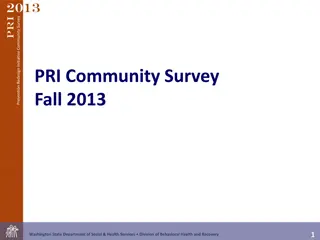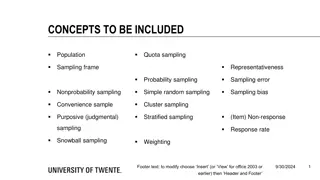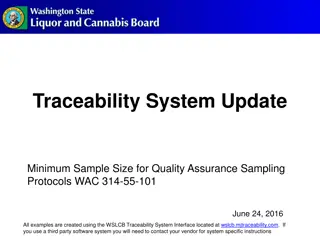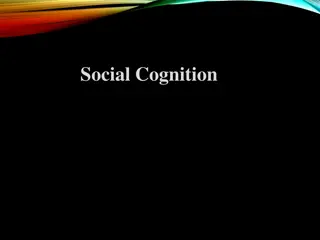Understanding Survey Data Analysis in SAS: Methods and Applications
Explore the nuances of survey data analysis in SAS, covering topics such as populations and samples, complex survey samples, stratified sampling, and more. Learn how to ensure representativeness in sampling and optimize precision of estimates in survey studies.
0 views • 31 slides
Understanding Weighting Strategies for Disaggregated Racial-Ethnic Data
Delve into the importance of weighting strategies for disaggregated racial-ethnic data in health policy research. Learn about the purpose of weighting, considerations, and when weights are unnecessary. Discover how survey weights ensure the representativeness and generalizability of data to target p
3 views • 56 slides
Systematic Analysis of Real Samples in Analytical Chemistry
This analysis covers the systematic process involved in analyzing real samples, including sampling, sample preservation, and sample preparation. It discusses the importance of accurate sampling in obtaining information about various substances, such as solids, liquids, gases, and biological material
0 views • 54 slides
Demographic Comparison for Representativeness in Oregon ACT Program Evaluation Focus Groups
The study evaluates the representativeness of focus group samples in the Oregon ACT Program. It compares demographic characteristics such as age, gender, race/ethnicity, medication use, and days homeless between the entire ACT population and focus group participants. The findings show differences in
0 views • 28 slides
Monitoring Faroe Current Transport with Satellite Altimetry and In-situ Observations
Combining satellite altimetry and in-situ observations offers a comprehensive approach to monitoring volume, heat, and salt transports in the Faroe Current. The study focuses on the representativeness of ocean observations in the Arctic and Subarctic regions, highlighting the importance of combining
0 views • 11 slides
Washington State Department of Social & Health Services - 2013 Prevention Redesign Initiative Community Survey
The Washington State Department of Social & Health Services conducted the 2013 Prevention Redesign Initiative Community Survey to gather data on adult beliefs about youth substance use, community norms, law enforcement effectiveness, and more. The survey aimed to provide insights for needs assessmen
0 views • 13 slides
Understanding Online Grocery Shopping Trends in the UK
E-commerce is a growing sector with significant online retail expenditure in the UK. While the online grocery market is small compared to offline, it is projected to rapidly expand. This study aims to investigate consumption behaviors, representativeness of online grocery samples, price sensitivity
0 views • 27 slides
Understanding Sampling Techniques in Research
This content delves into the significance of sampling in research, covering quantitative and qualitative approaches. It discusses key concepts such as samples, populations, representativeness, sample size, and weighting. Various sampling methods for different types of research, including household s
0 views • 28 slides
National Travel Survey (NTS) Analysis: Insights on Travel Behavior and Patterns
The National Travel Survey (NTS) module of the QNHS provides detailed information on travel behavior collected from respondents within the State. It covers data on the number of journeys, reasons for travel, mode of transport, journey duration, and distance traveled. The survey is a comprehensive ho
0 views • 30 slides
Understanding Cognitive Biases in Decision Making
Explore Tversky and Kahneman's research on heuristics and biases, Slovic's insights on risk misperceptions, and the implications of cognitive biases in decision-making processes. Delve into topics such as representativeness, availability bias, anchoring, and Prospect Theory by Kahneman and Tversky.
0 views • 12 slides
Understanding Participant Selection in Research
Exploring the intricate process of selecting research participants, this content covers topics such as sampling methods, population versus samples, choosing the right participants, and the importance of generalization in research. It delves into the significance of probability and nonprobability sam
0 views • 15 slides
Understanding Sampling Methods in Research
Explore key concepts in sampling such as probability and non-probability methods, sampling error, representativeness, and types of biases. Learn about the importance of sampling in research, theoretical variables, conceptualization, and operationalization. Evaluate different types of sampling proces
1 views • 20 slides
Industry Initiative: European Access Hurdles Portal Findings
The European Access Hurdles Portal, established in 2022, aims to enhance transparency in understanding the reasons behind delays and unavailability of innovative medicines. The industry's commitment to providing insights into root causes of unavailability is evident through the portal's reports. The
0 views • 13 slides
Quality Assurance Sampling Protocols for Flower Lots under WAC 314-55-101
Quality assurance sampling protocols for flower lots under WAC 314-55-101 dictate that at least 4g of flower lot samples are required, with procedures outlining the deduction of four separate samples from different quadrants of the lot to ensure representativeness. The WSLCB Traceability system enfo
0 views • 4 slides
Understanding Social Cognition and Schemas
Social cognition explores how people perceive and interpret social information, using automatic and controlled thinking processes. Schemas are mental structures that help us organize knowledge about the social world, affecting how we remember, interpret, and act upon information. The self-confirming
0 views • 23 slides














